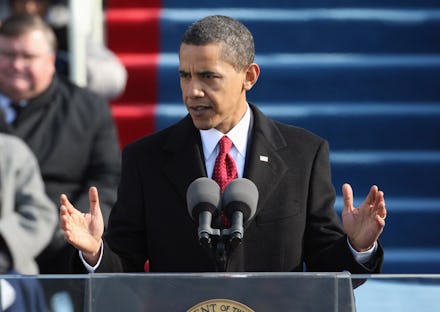Obama's Approval Rating Would Surge If Americans Knew These 5 Facts

“That we are in the midst of crisis is now well understood.”
Barack Obama uttered this phrase fewer than 150 words into his first inaugural address, and he continued to use it as a guide for the rest of his speech, interweaving themes of responsibility and renewal. Five years later, Obama is about to begin his twilight years as president, with the midterm elections next year and the beginning of the 2016 presidential campaign. The 2009 inauguration is now, in political terms, ages ago.
Obama's inauguration came with high expectations, and while it is tempting to look back on that moment with cynicism, in the years since Obama has pursued every promise he made.
The president's approval rating just dipped below 40%; there's a good chance that would change if Americans took a look at the facts.
1. The Economy
From the 2009 inauguration: “The state of our economy calls for action: bold and swift. And we will act not only to create new jobs but to lay a new foundation for growth. We will build the roads and bridges, the electric grids and digital lines that feed our commerce and bind us together.”
Eight days after Obama's inauguration, the Recovery and Reinvestment Act passed the House. The economic recovery has been slow — unemployment peaked at 10% in late 2010, and currently sits at just over 7%. Only at the end of 2010 did the economy begin to regain its strength. In addition to the Recovery and Reinvestment Act, Obama oversaw financial reform, headlined by the Dodd-Frank Bill, and the resolution of the bank bailout crisis.
That legislation also included over $100 billion for infrastructure development. In March 2013, Obama announced a new infrastructure plan, but It has yet to be passed by Congress.
2. Health Care
From the 2009 inauguration: “We will restore science to its rightful place and wield technology's wonders to raise health care's quality and lower its costs.”
Obama's Affordable Care Act passed Congress, survived its day in court, and is now a public experiment, despite its troubled roll-out last month. The administration backtracked on some initial claims, including the ability for individuals to keep their existing insurance plans. However, the key policies of the legislation, including the pre-existing conditions clause, remain popular. You can expect the ACA to stick around for the long term.
3. Energy
From the 2009 inauguration: “We will harness the sun and the winds and the soil to fuel our cars and run our factories... We'll work tirelessly to lessen the nuclear threat and roll back the specter of a warming planet.”
Obama’s desire for a nuclear-free world is well known. He signed a treaty with Russia agreeing to reduce the countries' arsenals by 30%. However, Iran continues to enrich uranium (for peaceful purposes or not), and the security of Pakistan’s nuclear weapons remains in question.
The president's record is clearer on climate change. He has consistently supported clean coal as well as nuclear and solar power. One of Obama's first executive orders was to increase fuel efficiency standards.
Three high-profile environmental issues have marked the president's time in office. The Deepwater Horizon oil rig exploded in 2010, calling into question drilling safety regulations. The Solyndra bankruptcy marred a major investment push into renewable energy, and Obama continues to face a decision on the Keystone Pipeline.
4. Education
From the 2009 inauguration: “We will transform our schools and colleges and universities to meet the demands of a new age.”
As a rider on the Affordable Care Act, the Obama administration passed an education bill that reforms student loans and repayments. Additionally, Obama has enacted a “Race to the Top" education program, which provides increased funding to states that successfully implement education reform.
College costs, however, continue to rise, and some fear the amount of student debt could be the next economic bubble; meanwhile, Race to the Top is seemingly under constant criticism and results have varied on a state-by-state basis.
5. Iraq and Afghanistan
From the 2009 inauguration: “We'll begin to responsibly leave Iraq to its people and forge a hard-earned peace in Afghanistan.”
The last combat troops pulled out of Iraq in 2010; 51,000 remain in Afghanistan. This number is set to fall to 34,000 early next year, but an agreement to keep American troops in the country past the 2014 deadline will be discussed in Afghanistan later this month.
The most divisive foreign policy issue for Obama continues to be the use of drones. Initially a proponent of a quick surge in Afghanistan, Obama has since given way to Vice President Joe Biden’s "counterterrorism plus" strategy, promoting the use of drones and accepting the role of the Taliban in the Afghan government.
Running for re-election in 2012, Obama often faced criticism for failing to live up to the lofty expectations he set in his 2009 inauguration speech. These accusations of failure were a bit unjust; Obama faced high expectations because of the remarkable success of his campaign and his message. His inaugural address was a pivot from the hope of the campaign to the realities of governing, focusing American leadership on a new set of values and actions. While Obama hasn’t achieved success across the board he has made progress on every single promise he made in his first inaugural address.